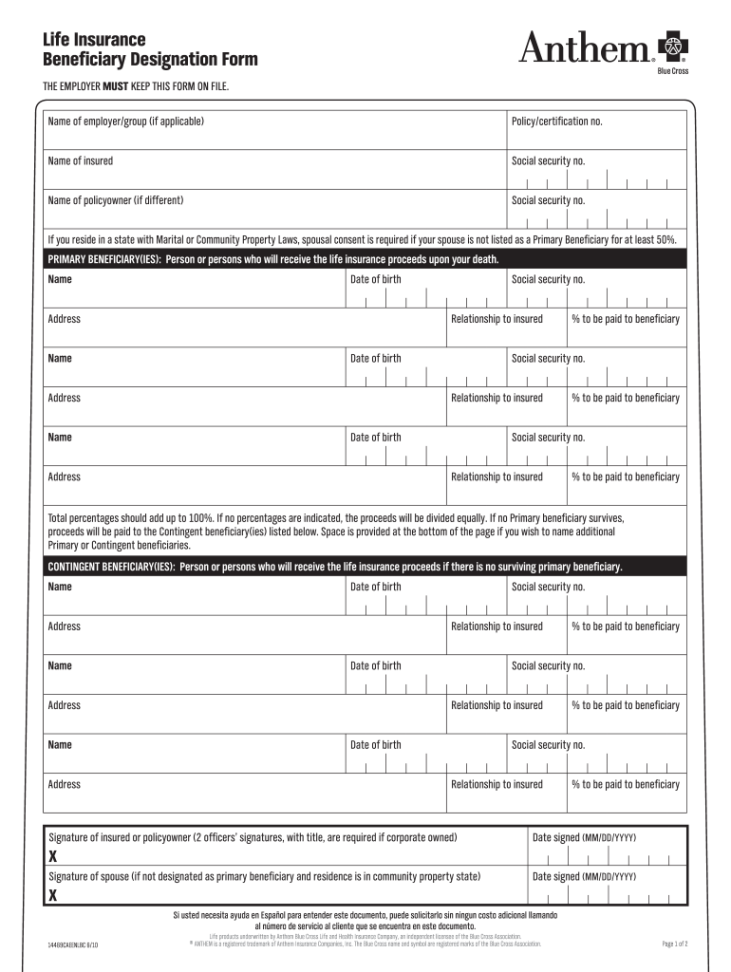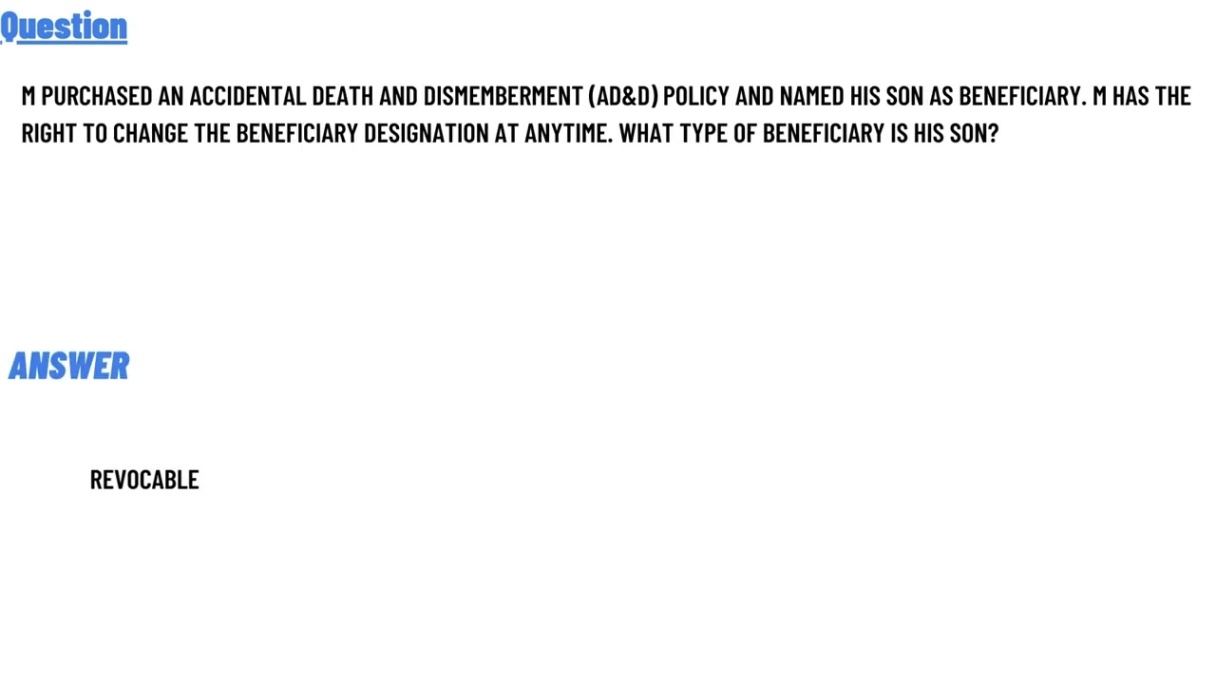Beware: Policyholders Have Limited Rights Under Certain Beneficiary Designations!
Watch Out: Policyholder Rights Limited!
When it comes to life insurance policies, many people may not realize that their rights as a policyholder can be limited under certain beneficiary designations. This is a crucial aspect to be aware of, as it can have a significant impact on your coverage and benefits.

Image Source: pdffiller.com
One of the key things to watch out for is the designation of irrevocable beneficiaries. When you name someone as an irrevocable beneficiary, you are essentially giving up your right to change or revoke that designation without the beneficiary’s consent. This means that even if your circumstances change or you have a falling out with the beneficiary, you may not be able to make any changes to your policy without their approval.
It’s important to carefully consider the implications of naming someone as an irrevocable beneficiary. While it may seem like a good idea at the time, you never know what the future holds. It’s always best to maintain some level of flexibility with your policy to ensure that you can make changes as needed.

Image Source: isu.pub
Another factor to be mindful of is the rights of contingent beneficiaries. Contingent beneficiaries are the individuals who will receive the policy benefits if the primary beneficiary is unable to do so. However, some policies may limit the rights of contingent beneficiaries, particularly if the primary beneficiary is irrevocable.
In some cases, contingent beneficiaries may not have the same level of control or say in how the benefits are distributed. This can be a potential issue if the primary beneficiary is not acting in the best interests of the policyholder or if there are disputes among the beneficiaries.

Image Source: ytimg.com
Furthermore, policyholders should be cautious of limitations on beneficiary choices. Some policies may restrict who you can name as a beneficiary, which can impact your ability to provide for your loved ones in the way you see fit. It’s essential to review the terms of your policy carefully to ensure that you have the freedom to choose the beneficiaries that matter most to you.
In addition to these limitations, policyholders should also be aware of the potential consequences of failing to update their beneficiary designations. Life changes such as marriage, divorce, births, or deaths in the family can all impact who should receive the policy benefits. Failing to update your beneficiary designations can result in the wrong people receiving the benefits or even legal disputes among family members.

Image Source: westernsouthern.com
To avoid any potential issues, it’s essential to regularly review and update your beneficiary designations as needed. This ensures that your policy benefits will be distributed according to your wishes and that your loved ones will be taken care of in the event of your passing.
In conclusion, policyholders need to be vigilant about the limitations on their rights under certain beneficiary designations. By staying informed and proactive, you can ensure that your policy benefits will be distributed according to your wishes and that your loved ones will be protected. So, watch out for these potential pitfalls and take the necessary steps to safeguard your policy and your loved ones.
Beneficiary Designations: Know the Limits

Image Source: ytimg.com
Have you ever taken a closer look at your insurance policy and noticed the section on beneficiary designations? It may seem like a simple formality to fill out, but choosing the right beneficiaries can have a significant impact on your loved ones’ financial future. However, it’s important to be aware that policyholders have limited rights under certain beneficiary designations, so it’s crucial to understand the limits before making any decisions.
When you designate a beneficiary on your insurance policy, you are essentially choosing who will receive the death benefit when you pass away. This can be a spouse, child, family member, friend, or even a charitable organization. While the process may seem straightforward, there are limitations and restrictions that policyholders need to be aware of.
One common limitation on beneficiary designations is the irrevocable designation. This means that once you have named a beneficiary as irrevocable, you cannot change or revoke that designation without the written consent of the beneficiary. This can be problematic if your circumstances change, such as getting divorced or falling out with a family member, and you no longer want them to receive the death benefit.
Another limitation to be aware of is the per stirpes designation, which determines how the death benefit will be distributed among your beneficiaries. With this designation, if a beneficiary predeceases you, their share of the death benefit will be divided equally among their descendants. While this can be a fair way to ensure that your loved ones are taken care of, it can also limit your control over who ultimately receives the benefit.
It’s also important to consider the impact of beneficiary designations on your estate planning. In some cases, the death benefit from an insurance policy may be subject to estate taxes, depending on how the policy is structured and who the beneficiaries are. This can have significant financial implications for your loved ones, so it’s important to consult with a financial advisor or estate planning attorney to understand the potential tax consequences.
In addition to these limitations, policyholders should also be aware of the potential for disputes and challenges to beneficiary designations. If there is any ambiguity or conflict in the designation, it can lead to lengthy legal battles and delays in the distribution of the death benefit. To avoid these complications, it’s important to clearly communicate your wishes and ensure that your beneficiary designations are up to date.
Overall, while beneficiary designations are an important aspect of your insurance policy, it’s crucial to be aware of the limits and restrictions that can impact your rights as a policyholder. By understanding these limitations and seeking professional advice when needed, you can ensure that your loved ones are taken care of in the event of your passing. So, before you fill out that beneficiary designation form, take the time to know the limits and make informed decisions that will protect your financial legacy.
Stay Alert: Policyholder Rights at Risk
When it comes to purchasing insurance policies, many people focus on finding the best coverage at the most affordable price. However, what some policyholders may not realize is that their rights can be severely limited when it comes to naming beneficiaries on their policies. This can be a concerning issue that many individuals are not aware of, but it is important to stay alert and understand the risks associated with these limitations.
One of the key factors to be mindful of is the fact that policyholders may not always have the freedom to choose any beneficiary they desire. In some cases, insurance policies may come with restrictions on who can be named as a beneficiary. This can be due to various reasons, such as legal requirements, company policies, or specific circumstances outlined in the policy contract.
For example, some policies may only allow immediate family members to be named as beneficiaries, while others may restrict beneficiaries to certain organizations or entities. These limitations can catch policyholders off guard if they are not aware of them in advance, potentially leaving them with limited options when it comes to designating beneficiaries.
Furthermore, policyholders should also be aware that their rights can be at risk when it comes to changing beneficiaries on their policies. While some policies may allow for easy modifications to beneficiary designations, others may have strict guidelines or require additional documentation in order to make changes. This can be a frustrating experience for policyholders who may need to update their beneficiaries for various reasons, such as divorce, marriage, or the birth of a child.
In addition to restrictions on naming beneficiaries, policyholders should also be cautious of potential limitations on their rights in the event of a dispute over the policy. In some cases, beneficiaries may contest the policyholder’s choice of beneficiary, leading to legal battles and potential challenges for the policyholder. This can result in delays in receiving insurance benefits or even the possibility of the policyholder’s wishes not being honored.
It is crucial for policyholders to carefully review their insurance policies and understand any limitations on their rights when it comes to naming beneficiaries. By staying alert and informed, policyholders can avoid potential issues and ensure that their wishes are carried out in the event of their passing.
In conclusion, it is important for policyholders to be aware of the risks associated with limitations on beneficiary designations. By staying alert and understanding their rights, policyholders can avoid potential challenges and ensure that their wishes are upheld. Ultimately, being informed and proactive is key to protecting oneself and loved ones when it comes to insurance policies and beneficiary designations.
Be Aware: Limits on Beneficiary Choices
When it comes to life insurance policies, many people are unaware of the limitations that can be placed on their beneficiary choices. It’s important to understand that policyholders may not always have the freedom to choose whoever they want as a beneficiary. There are certain restrictions and guidelines that must be followed, and it’s crucial to be aware of these limitations to avoid any potential complications down the road.
One common limitation on beneficiary choices is the designation of irrevocable beneficiaries. When a policyholder designates a beneficiary as irrevocable, they are essentially giving up their right to change that designation without the consent of the beneficiary. This means that even if the policyholder’s circumstances change or they wish to designate a different beneficiary, they may not have the ability to do so unilaterally. It’s important to carefully consider the implications of naming irrevocable beneficiaries and to ensure that this designation aligns with your long-term goals and wishes.
Another limitation to be aware of is the potential for disputes among multiple beneficiaries. In cases where there are multiple beneficiaries named on a policy, conflicts can arise over the distribution of the policy proceeds. It’s important to clearly outline your wishes and intentions regarding the distribution of the policy proceeds to avoid any potential disagreements among your beneficiaries. Additionally, it may be beneficial to consult with a legal professional to ensure that your beneficiary designations are clear and legally binding.
Furthermore, policyholders should be cautious of designating minors as beneficiaries. In many cases, insurance companies will not distribute policy proceeds directly to minors, and a guardian or trustee may need to be appointed to manage the funds on behalf of the minor beneficiary. It’s important to consider the implications of naming a minor as a beneficiary and to make appropriate arrangements to ensure that the funds are managed responsibly and in the best interests of the minor beneficiary.
Additionally, some policies may have restrictions on who can be named as a beneficiary. For example, certain policies may have limitations on naming organizations or entities as beneficiaries, or may require that the beneficiary be a close relative or spouse. It’s important to review the terms of your policy carefully to understand any restrictions on beneficiary choices and to ensure that your chosen beneficiaries meet the criteria outlined in the policy.
In conclusion, it’s crucial for policyholders to be aware of the limitations that can be placed on their beneficiary choices. By understanding these limitations and carefully considering your options, you can ensure that your wishes are carried out and that your loved ones are provided for in the event of your passing. Be proactive in reviewing your beneficiary designations and seek guidance from a financial or legal professional if needed to ensure that your beneficiary choices align with your long-term goals and intentions.
a policyowners rights are limited under which beneficiary designation


